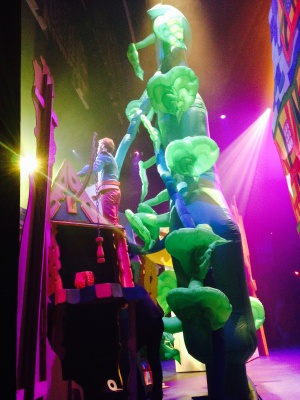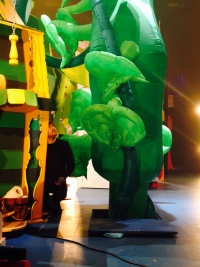Jack and the Beanstalk: Difference between revisions
| Line 114: | Line 114: | ||
Due to the size of the LX bars, it was necessary to brail a number of the bars. | Due to the size of the LX bars, it was necessary to brail a number of the bars. | ||
<pdf>Flyplot_V7.pdf</pdf> | |||
==Masking== | ==Masking== | ||
Revision as of 02:52, 15 December 2013
| Jack and the Beanstalk | ||||||||||||||||||||||||||
|---|---|---|---|---|---|---|---|---|---|---|---|---|---|---|---|---|---|---|---|---|---|---|---|---|---|---|
| ||||||||||||||||||||||||||
Company
Creative Team
Script Writer - Alan McHugh
Director - Alastair Hawthorn
Set & Costume Designer - Robin Peoples
Choreographer - Kerry McLellan
Musical Director - Doug Price
Lighting Designer - Oliver Gorman
Sound Designer & Operator - Sam Cunningham
Vocal Coach - Jean Sangster
Technical Team
Production Manager - Sandy McRobbie
Stage Manager- Natalie Wilson
Deputy Stage Manager - Rosie Barber
Assistant Stage Managers - Mary Crook, Chrissie Huxford
Technical Stage Manager - Jennifer Howes
Deputy Technical Stage Managers - Stuart Lord (Head Flys), Ian Smyth
Crew Supervisor - Kev Murray
Stage Crew - Riona Gilliland, Bradley Jones, Laura Mason, Kerry McAreavey, Kiri Newberry, Sean Quinn, Kirstin Rodger, Neil Smith, Daniel Thompson
Chief Production Electrician - Patrick Watson
Lighting Programmer and Operator - Elleanor Taylor
Sound No 1 - Sam Cunningham
Sound No 2 - Fraser Milroy
Video Technican - Rory Boyd
Stage Electricians - Mark Blythe, Shannon Howard
Follow Spot Ops - Stephen Cunningham, Nathalie Page
Props - April Clark, Darren Dewar, Edward Howat, Lorna Ratcliffe, Shoni Tavendale, Victoria Blackaby, Clara Fink, Zoe Kemp, Lisa Speirs
Costume - Rebecca Coyle, Helen McKnight, Nicola Russell, Ruth Walford, Carola Gudim, Evonne MacRitchie, Jade McNaughton, Sophie Prior
Construction - Connor Gallagher, Robert Gear, Lauren Keanie, Oliver Ralph
Scenic - Rosie Jacob, Carolyn Clark, Iona Gray, Gillian Reilly
Technical Stage Management
Groundplan
Flyplot
Due to the size of the LX bars, it was necessary to brail a number of the bars.
Masking
Pit Bridge
In previous performances which require the use of a pit bridge, there had been a number of various solutions to this problem.
For this show, it was felt that a stock platform, with stock treads should be built. This could then be customised with different height legs.
Technical Challenges
Beanstalk

A crucial element of any production of 'Jack and the Beanstalk' is not complete without a beanstalk... This year, our beanstalk was provided by the Designer, Robin Peoples. It consisted of a fan unit, with a large section of rip-stop fabric attached to the top, forming the 'beanstalk' element.
As we were concerned about the amount of noise the fan would produce if it were to be onstage, we sited the fan unit in the pit. One of the pallets in the stage floor was removed, and replaced with a trap unit.
As the beanstalk was of fabric construction, we used a spot line attached to the top, to prevent it flapping around the stage on inflation and deflation. Although a line of hemp was used to go from the flyfloor, through the grid, fishing line was used wherever the line would be visible. This was felt to be strong, but also relatively invisible.
After tech, it was felt that the Beanstalk was too short. Therefore it was extended with a small section of green rip-stop fabric, bought from Mandors. Whilst this wasn't visible in Act 1, due to the beanstalk being hidden behind the Cludgy truck. However, in Act 2, the bottom of the beanstalk was visible due to the absence of the Cludgy. It was felt that this was an acceptable trade off.
Giant's truck
Giant's foot
A slightly incongruous set element. This was not part of the original design, but only an idea. It was borrowed from the Lyceum in Edinburgh. Therefore, it was a very awkward set piece; one that didn't really fit the design of the show, or the size of the venue. It was used when The Giant was required to 'squash' Fleshcreep'.
In the latter part of the production process, it was discovered that all the foot was required to do be slid onto the stage, and then be removed a little while later. This took 3 crew members to operate. Whilst the foot was relatively light (being made of Arex), it's large size and the placement of the booms made this process a little awkward.
Fleshcreep's Dummy
Quick release shackle used for drop.
Portcullis
This was a relatively large set element, and one that was pivotal to the plot. It was required to open and shut relatively quickly, such as your average Castle Portcullis would operate.




